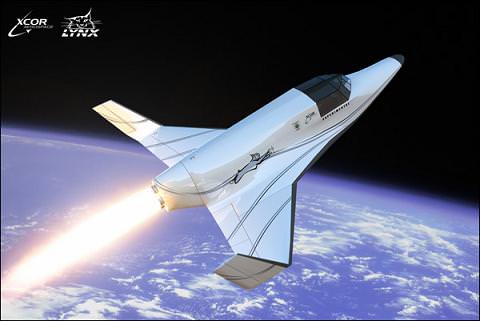

Kennedy Space Center is getting a new neighbor: XCOR Aerospace announced they intend to establish an operational base in Florida, and also hope to build a manufacturing and assembly center for the XCOR Lynx Mark II suborbital reusable launch vehicles.
“Looking over the KSC Visitor Complex grounds and seeing the history of U.S. human spaceflight and realizing that soon XCOR will be a part of the fabric of the Space Coast is very exciting to me personally and our company” said Jeff Greason, XCOR CEO. “When we started the company back in 1999, we could only have dreamt about the possibility of flying the person on the street or the citizen scientist to space from such an important place.”
KSC and NASA officials — as well as local officials dealing with the job losses from the end of the shuttle program — were thrilled with the news. XCOR’s new operations in Florida could bring new work for highly skilled former space shuttle employees.
“The next era in space exploration is under way, and the Space Coast of Florida is ground zero in the Obama administration’s effort to launch Americans from U.S. soil and create good jobs that support an economy built to last,” said NASA Chief of Staff David Radzanowski. “The region continues to be a key strategic location for companies, like XCOR, who want to build on our nation’s great legacy of innovation and entrepreneurship.”
“We look forward to discussing with XCOR Aerospace and other space companies how Kennedy’s unique capabilities may be made available for use,” said Kennedy’s Center Director Bob Cabana. “This is further evidence that the Space Coast is preparing for the next era of space exploration.”
XCOR made the announcement in Florida, with the Kennedy Space Center Visitor Complex as a backdrop.
The company hopes to fly the Lynx suborbital vehicle from Kennedy Space Center’s Shuttle Landing Facility, the Cecil Field Spaceport, or other suitable Florida locations by 2014. And if all goes well, they will also start building facilities to produce parts for the Lynx Mark II models and eventually production of Lynx vehicles and other XCOR products, “should market demand materialize and the emerging commercial space industry maintain its current momentum,” XCOR said in a press release.
They estimate direct job creation through late 2018 at just over 150.
“As chair of Space Florida, this is the type of investment the Space Florida Board has been working on to attract high-tech, high-wage jobs to Florida,” said Florida Lt. Governor Jennifer Carroll. “We are very pleased to welcome XCOR to Florida as a prime example of how utilizing Florida’s existing infrastructure and leveraging our talented workforce capabilities can attract new and growing business to our state.”
NASA said they are working with XCOR and other commercial space companies so that KSC could be host to many kinds of spacecraft and rockets in the future.
“Negotiations are taking place with other commercial users for Orbiter Processing Facility Bays 1 and 2, as well as with potential commercial users of the Launch Complex 39 launch pads,” NASA said in a statement. “These and other partnerships will cement Kennedy as a true multiuser spaceport as envisioned by our nation’s leadership.”
Lead image: XCOR’s Lynx suborbital vehicle. Credit: XCOR
The Andromeda Galaxy, our nearest large neighbour, has 36 identified dwarf galaxies. The Hubble telescope…
Rogue planetary-mass objects, also known as free-floating planets (FFPs) drift through space alone, unbound to…
The effects of Climate Change on Earth's living systems have led to a shift in…
Our Milky Way Galaxy is rich in dark matter. The problem is, we can't see…
Neutrinos generated through solar fusion reactions travel effortlessly through the Sun's dense core. Each specific…
Innovation is a history of someone trying to build a better mouse trap - or…